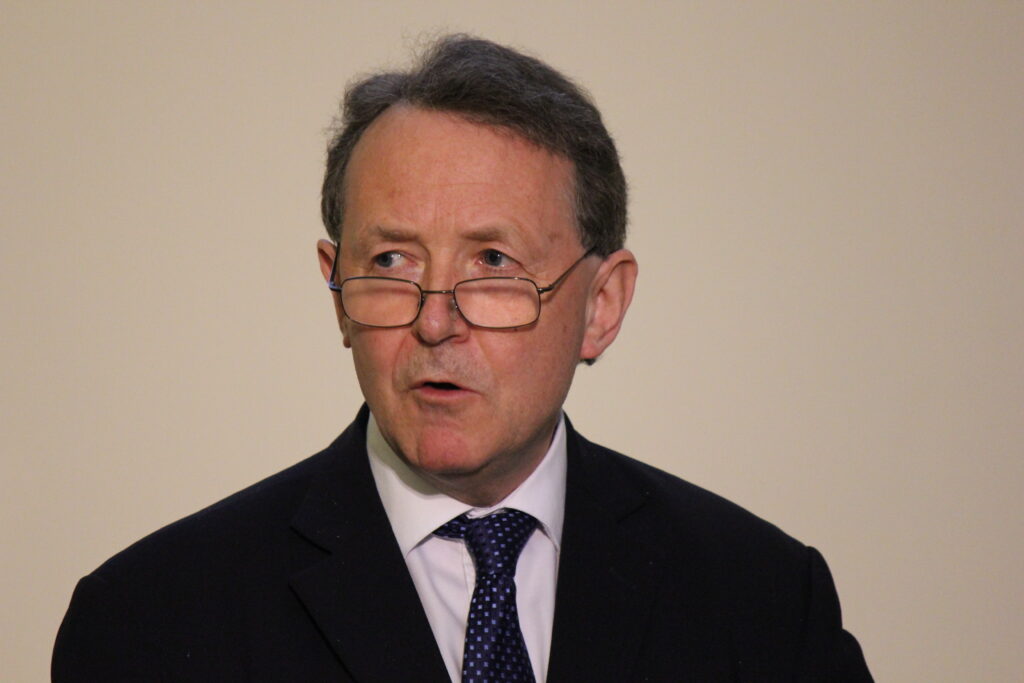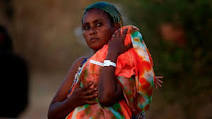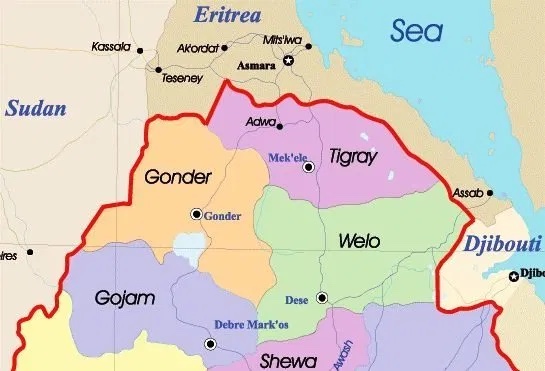War in Ethiopia’s Tigray Province – Government challenged today to co-ordinate an international response to a potential genocide during exchanges in the House of Lords
Private Notice Question Asked by

Lord Alton of Liverpool
To ask Her Majesty’s Government what assessment they have made of the conflict in Tigray; and what steps they are taking to co-ordinate international action to prevent further violence.
Lord Alton of Liverpool (CB)
My Lords, I beg leave to ask the Private Notice Question standing in my name on the Order Paper and in so doing, I declare my interests as the vice chair of the All-Party Parliamentary Group on Eritrea and as a patron of the Coalition for Genocide Response.
The Parliamentary Under-Secretary of State, Foreign, Commonwealth and Development Office (Baroness Sugg) (Con)
My Lords, the UK is deeply concerned by ongoing violence between federal and regional forces in the Tigray region of Ethiopia. The Foreign Secretary spoke to Prime Minister Abiy on 10 November to emphasise the need to protect civilians and allow humanitarian access. He also urged de-escalation of the violence and swift moves to political dialogue. We remain in contact with the Ethiopians, the region and our partners in the international community to achieve these goals.
Lord Alton of Liverpool (CB)
My Lords, in thanking the Minister for that reply, I know that she will have seen the reports I sent her about the threatened impending assault on the Tigrayan capital of Mekelle, and attacks on refugee camps—both are war crimes—along with the horrific violence against women and children, which one report suggests may be on the edge of genocide. Given that the Ethiopians say that they will “show no mercy” to Mekelle, with 500,000 in imminent danger, what will we do to fulfil our duties under the genocide convention to prevent, to protect and to punish? What urgent steps are we taking through the United Kingdom envoy for the Horn and Red Sea, with our allies in the Gulf, through the African Union and the United Nations to avert yet more deaths, carnage and instability, and more refugees?
Baroness Sugg (Con)
I am grateful to the noble Lord for sharing the information he has received, which is among many concerning reports we have seen. Reports of an imminent push on to the city of Mekelle, with time-limited threats, are a very serious concern. We have been consistent in our messaging that civilians must be protected and humanitarian access granted. Given the continued conflict, and as a complement to the efforts of the region to press for mediation, we will continue to press these messages with all relevant international partners, including at the UN Security Council, where the issue is due to be discussed imminently.
Lord McConnell of Glenscorrodale (Lab)
My Lords, this situation reinforces the critical importance of having an atrocity prevention strategy at the heart of the new Foreign, Commonwealth and Development Office. Can the Minister outline for us any commitments that the UK has through the Conflict, Security and Stability Fund to conflict prevention in Ethiopia and the region? In doing so, can she affirm the critical importance of United Kingdom overseas development assistance in conflict prevention and development, which we know is an absolute prerequisite for peace, and will she perhaps indicate to the Chancellor that he should not be breaking manifesto promises tomorrow?
Baroness Sugg (Con)
My Lords, the noble Lord is absolutely right that conflict is a key part of our overseas development assistance. We have a conflict, security and stabilisation force programme in Ethiopia, which works to support a peaceful and inclusive political transition. We also have wider programmes in the region which support the peace process and work to stop conflict while promoting human rights, and delivering women, peace and security objectives. I hope noble Lords will forgive me if I do not speculate ahead of a fiscal event.
Lord Chidgey (LD) [V]
My Lords, it is reported that as many as 200,000 refugees are anticipated to cross into Sudan in the coming months through the Hamdayet border in Kassala state, the Lugdi in Gedaref state and the Aderafi border. With close to 2 million IDPs already in the region, will the Minister confirm that we are asking our UK representative in the UN to raise this conflict as a matter of urgency with the Security Council, while supporting the African Union’s efforts to bring a halt to the fighting through the good offices of the senior African statesmen who have been allocated to it? Without delay, will the Government assist the UNHCR, the WFP and other agencies, providing the support they need to cope with this immediate crisis?
Baroness Sugg (Con)
My Lords, we are working closely with the African Union to ensure that it is doing all it can to stop this conflict. We have actively supported the A3+1 to bring this on to the agenda at the UN Security Council. We are of course working with UN agencies such as the UNHCR, the WFP and UNOCHA to provide support for the many thousands of refugees who so desperately need it.
Baroness Anelay of St Johns (Con) [V]
My Lords, I welcome what my noble friend has just said about working closely with the African Union. What discussion has our ambassador, Dr McPhail, had with it regarding the work of the Intergovernmental Authority on Development, which could play a key role in conflict resolution, as indeed it has in South Sudan?
Baroness Sugg (Con)
I agree with my noble friend. We have been engaging with the AU and IGAD, including when the Foreign Secretary spoke to the Prime Minister of Sudan, who is the chair of IGAD. He has also spoken to the Minister of International Relations in South Africa, which is of course the current AU chair. We share their view that de-escalation and political dialogue is needed. Our ambassador, Dr McPhail, will continue to co-ordinate with the AU and IGAD on finding a political solution to the conflict.
Viscount Waverley (CB) [V]
Does the Minister agree that indiscriminate shelling of Mekelle would be a war crime, and that we must galvanise international action to bring any perpetrators to justice? Is the world going to stand by yet again, knowing that mayhem is seemingly set to unfold, do nothing and then have to deal with the added consequences of regional instability and the combination of Somalia, Sudan and Yemen across the way ripe for Islamist groups or Governments to exploit?
Baroness Sugg (Con)
My Lords, from the Foreign Secretary to our ambassadors in Ethiopia, Eritrea and Sudan, we are talking urgently to partners across the region and the world to ensure that humanitarian support can reach those who need it most. We are also doing everything we can to de-escalate the conflict. Leaders on both sides must refrain from ethnic-based violence and discrimination. They must stress the importance of respecting human rights and avoiding civilian loss of life. I agree with the noble Viscount: there must be accountability for human rights abuses.
Lord Collins of Highbury (Lab)
My Lords, after the conflict of the 1980s we are on the brink of another tragedy. Civilians are caught between violent rebels willing to die and a Government threatening to shell a city. Why has it taken until today for the UN Security Council to meet? What is the United Kingdom doing to secure critical humanitarian corridors and human rights access to NGOs? Does the Minister agree that this is exactly the wrong time to slash Britain’s crucial 0.7% commitment to humanitarian aid?
Baroness Sugg (Con)
My Lords, as I have said, we are deeply concerned by the unfolding humanitarian catastrophe. The figures that the UN estimates are heartbreaking. We must do all we can in international fora to bring this issue to the table, while continuing our diplomatic work. Regarding 0.7%, to me it is a source of great pride that the United Kingdom has been a development superpower and contributes so much to the world. Our support and leadership on development has saved and changed millions of lives; noble Lords can see that in the work and progress we have seen in Ethiopia.
Lord Oates (LD) [V]
My Lords, I welcome the Minister’s comments on 0.7% and certainly hope that we will not see that budget cut to fund bombs and bullets in the defence budget. The Minister has recognised the dangers of the war spreading beyond Ethiopia’s borders. Can she therefore tell the House whether the Government have been in communication with the Eritrean Government to commend their restraint following the TPLF rocket attack on Asmara, and to urge them to continue to avoid responding to provocations?
Baroness Sugg (Con)
My Lords, we continue to engage with our partners in Ethiopia and across the regions. On Eritrea specifically, we continue to track the situation, raise our concerns about the deaths of civilians and raise the importance of respect for human rights in meetings with regional leaders.
Baroness Chalker of Wallasey (Con)
My Lords, I ask my noble friend whether we have pressed for discussion with the Eritrean Government? I know that they now have a good relationship thanks to Prime Minister Abiy. They will have a very clear view of how to put down the insurrection that is going on in Eritrea, which is exacerbating the terrible situation in Tigray. I hope that the three eminent Africans will be able to bring some peace, as they have done in their own countries. I ask my noble friend whether we can work on the refugee and displaced person situation? They are mainly in Sudan, but they are coming from Eritrea as well as Tigray and the surrounding area, the whole of which is now in considerable jeopardy because of the action between Tigray and the Ethiopian Government.
Baroness Sugg (Con)
My Lords, of course, we welcome the involvement of Eritrea to help to bring about an end to this conflict. We share the view of the African Union that de-escalation and political dialogue is needed, and we welcome the offers of mediation by the AU and President Ramaphosa of South Africa. While Abiy has agreed to meet with the envoys, he has so far declined offers of mediation. We encourage the Ethiopians to engage to help bring about a dialogue that ends conflict and focuses on a political solution. The latest figures we had this morning from UNHCR showed that, as of 22 November, over 41,000 people have arrived in Sudan. I am sure that, like me, many noble Lords will have seen the distressing footage of people fleeing for their safety. They must be supported, and that is what we are working to do.
Lord Triesman (Lab) [V]
My Lords, many years of close contact with Ethiopia taught me, as Minister for Africa, how vital it is to sustain security in the country. It is vital for the Horn of Africa, for the African Union, whose headquarters are in Ethiopia, and for avoiding humanitarian catastrophes. I welcome what the Minister has said about international links, and I hope that they will be pursued with the energy that she has conveyed. Will the Minister and the Foreign Secretary meet with me urgently to discuss steps to provide safety in the United Kingdom for the Tigrayan Ethiopian leaders and their families, who were key allies of ourselves and the United States at many vital times over the last 15 to 20 years and who now face ethnic purges that may be on the edge of genocide?
Baroness Sugg (Con)
As the noble Lord knows from his previous role and as he highlights, Ethiopia plays an incredibly important role in stability across the region, not least through its contributions to the UN peacekeeping operations. A prolonged conflict could have further implications for regional stability in the Horn of Africa. I am very happy to meet with the noble Lord to discuss refugees.
Baroness Kennedy of Cradley (Non-Afl)
My Lords, I declare an interest as a patron of Action on Poverty. The clock is ticking down on the threatened 72-hour ultimatum for the military assault on Tigray, where bombings and massacres have already driven 40,000 Ethiopians to flee to Sudan. What are the Government seeking to achieve from the imminent UN Security Council meeting to pull back the threatened offensive? What further steps are the Government planning to ensure free, safe and unhindered humanitarian access to the Tigray region and give the refugees the support they need?
Baroness Sugg (Con)
My Lords, I share the noble Baroness’s concern about the reports on the imminent push. As I say, we have been, and are delighted to be, supporting the UN Security Council to discuss the issue. Our objective is for the parties to de-escalate, to ensure the protection of civilians and to avoid further spillover into the neighbouring regions of Ethiopia. Of course, ensuring access for humanitarian actors is essential; we have pushed, and will continue to push, for that. As I said, the refugees desperately need our help.
Lord Lancaster of Kimbolton (Con)
My Lords, I was privileged to be the first Minister to visit Ethiopia, a few days after the election of Prime Minister Abiy in 2018. I left with a deep appreciation of just how vital a stable Ethiopia is to the wider stability of the Horn of Africa. I ask my noble friend what specific military and security assistance we are offering to try to ensure that the terrible events in Tigray do not stretch to a wider region?
Baroness Sugg (Con)
My Lords, the conflict is currently focused on the Tigray region in northern Ethiopia, but, as my noble friend says, it is likely to have a negative impact on the political stability and security in other parts of Ethiopia. We strongly value our relationship with Ethiopia, and it has a key role to ensure that we promote stability and security across the region. I spoke earlier about the CSSF regional programming; we also work on capacity building in countries such as Somalia through the training of troops and will continue to work closely with our regional partners in order to assist their stabilisation efforts.
Baroness Uddin (Non-Afl)
My Lords, on several occasions I witnessed at first hand the devastation of the torture, rape and murder of the Rohingya people at the hands of the Burmese Government. International communities were too slow to protect, punish and prevent the perpetrators of genocide and ethnic cleansing, leaving Bangladesh largely to manage to refugee population of 1 million. What are our Government doing to prevent a similar fate for the Ethiopian people on this occasion and to assist Sudan with the resources that it will so desperately need to manage the refugees?
Baroness Sugg (Con)
My Lords, we are very proud to be one of the largest donors to the Rohingya people, and we will continue with that commitment to help them deal with the tragic situation that they find themselves in. We are monitoring the violence in Ethiopia very closely. As I say, we are clear that we need to see de-escalation and political dialogue, which we think is the only way forward to prevent further violence. As party to the UN Convention on the Prevention and Punishment of the Crime of Genocide, we are firmly committed to the prevention and punishment of genocide. We will continue to support the refugees; we are supporting them through our FCDO bilateral programmes and will carefully consider what further support is available for the UN agencies which are doing such vital work to help them.
The Deputy Speaker (Lord Alderdice) (LD)
My Lords, the time allowed for this Private Notice Question has elapsed.
See:



